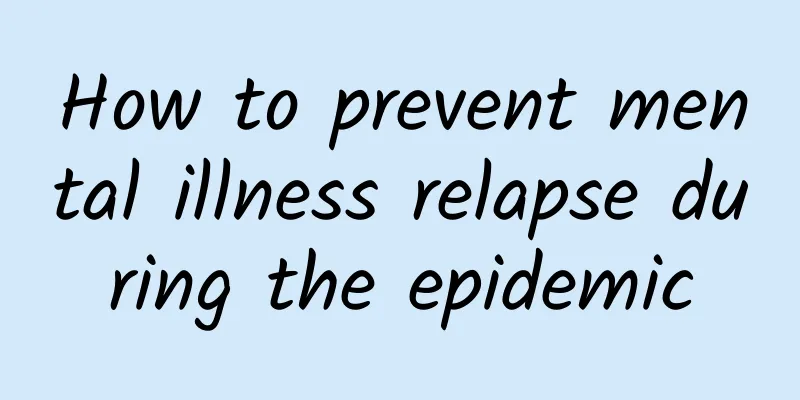How to prevent mental illness relapse during the epidemic

|
Since the outbreak of the new crown pneumonia epidemic, various types of information have emerged in an endless stream. In particular, the epidemic has recently shown the characteristics of many points, wide coverage and frequent occurrence, involving many provinces and chains. The epidemic situation is severe and complicated. When the epidemic is at the "doorstep", it really makes many people feel nervous and uneasy. For people with underlying mental illnesses such as depression, anxiety, bipolar disorder, schizophrenia, etc., they are more likely to have emotional fluctuations and changes in mental activities. Especially due to the lockdown, control, and prevention of the epidemic community, the suspension of public transportation, the suspension of express delivery, the suspension of some clinics, and the suspension of some hospitals to admit patients to the hospital, etc., all kinds of inconveniences have caused problems such as difficulty in seeking medical treatment and purchasing medicines. In addition, spring is a high-incidence period for relapses of mental illness, and patients are facing the risk of relapse. How to prevent the recurrence of the disease during the special period of the epidemic? What should I do if I get sick without medicine? How can I sleep without taking medicine? What should I do if I can't go to the hospital and feel chest tightness and panic? What can I do if the patient has repeated suicidal thoughts and behaviors and cannot be hospitalized? Similar questions are the most frequently consulted questions on the hotline recently. There are eight suggestions for special periods for your reference First, you must adhere to the doctor's orders to take medicine. This is currently considered the most effective way to reduce recurrence. Don't think that you don't need to take medicine when you are well, and don't think that long-term medication will make your brain stupid, or refuse to take medicine because you think that the medicine has great side effects. A large number of facts have shown that 70%-80% of self-reduction or discontinuation of medication will lead to recurrence. During the epidemic, the work and rest routine may be disrupted, three meals a day may become two meals a day, and the patient himself may also neglect to take medicine on time. Therefore, set an alarm on your mobile phone or clock, or put a note in a visible place to remind you to take medicine on time. Second, regular check-ups are required. Medication should be adjusted according to the condition, and psychological treatment should be carried out. During the epidemic, hotlines, WeChat and other forms of communication can be used to communicate with medical staff in a timely manner. Third, you should maintain a good emotional state. Discuss with your family members when encountering problems, do as much labor as possible, learn to look at problems from multiple angles, understand people and things with a grateful heart, maintain a peaceful state of mind, play to your strengths and avoid your weaknesses, learn from your strengths to make up for your weaknesses, cultivate self-confidence, weaken the character weaknesses of being withdrawn, sensitive, suspicious, and bad-tempered, so as to enhance your ability to resist diseases. Fourth, try to avoid adverse mental and psychological stress factors and build a good living environment. Family members should care for patients, understand, accept and tolerate some mental symptoms. If patients lack self-confidence, family members should encourage and support them more. Fifth, we should arrange daily life reasonably to improve psychological immunity. Make life organized, eat and live regularly, and avoid overwork. Carry out some indoor leisure and entertainment activities to enrich your daily life, such as watching TV, reading, listening to music, doing handicrafts, painting, practicing Tai Chi, doing exercises, yoga, aerobic dance, playing small games, looking at old photos, chatting with family members, calling friends and relatives who cannot meet, etc. Avoid drinking, smoking, strong tea, coffee, and stimulating food before going to bed. Do not watch movies, TV shows, or novels that affect mood changes. Sixth, we need to observe the changes in symptoms and understand the signs of relapse. The focus is on "changes". This includes: changes in sleep after one week of continuous insomnia, abnormal changes in mood, occasional impulsive attacks, behavioral changes such as self-harm, sensitivity and suspicion, talking to oneself and laughing, abnormal speech and thinking, etc. We must pay close attention to ensure the health and safety of the patient and others. Contact the doctor in time for timely intervention and treatment to avoid recurrence and aggravation of the disease. Seventh, we should do a good job of personal protection, encourage participation in some public welfare activities, and improve cognitive ability, such as participating in online and offline activities of the UFE group of family experts of patients with mental disorders, learning some mental psychology knowledge to jointly maintain physical and mental health and good social adaptability. Eighth, if the symptoms persist, you should seek professional help. When you feel nervous, you can do some breathing relaxation exercises. After self-comfort, adjustment and the company of your family, most of the symptoms will be relieved. If the symptoms persist or even worsen, it is recommended to see a doctor. Finally, I would like to remind everyone to remember this jingle: When the epidemic strikes, take good protection; learn about knowledge and reduce going out; respond proactively and maintain a regular schedule; eat well, sleep well, and stabilize your emotions; make sure to take medication and observe symptoms; support from relatives and friends, and seek help if you feel unwell; protect yourself, and the green code will run; health and safety will be with you. Expert Recommendation Director of the Mental Rehabilitation Center of Shenyang Anning Hospital, Executive Deputy Director of Shenyang Mental Psychological Rehabilitation Clinical Medicine Research Center, Head of Shenyang Psychological Counseling Hotline Studio, Chief Physician, Professor, National Psychotherapist. Distinguished Professor of Shenyang Medical College, Teachers College of Shenyang University, and Liaoning He's Medical College; Member of the Mental Psychology Group of the Sleep Professional Committee of the Chinese Medical Doctor Association; Member of the Professional Committee of Elderly Mental Health of the Chinese Mental Health Association; Standing Member of the Psychology Branch of the Chinese Society of Geriatrics and Gerontology; Deputy Group Leader of the Psychological Rehabilitation Science Popularization Professional Group of the Popular Science Health Education Working Committee of the Chinese Medical Education Association; Executive Director of the Liaoning Mental Health Association; Executive Director of the Liaoning Psychological Counselor Association; First Vice Chairman of the Youth Mental Health Professional Committee of the Liaoning Psychological Counselor Industry Association, Vice Chairman of the Shenyang Jing Association; Well-known Health Education Expert in Shenyang, etc. He has been engaged in clinical psychiatry for 33 years and is good at preventing, diagnosing, treating and rehabilitating various mental and psychological disorders with the concept of big rehabilitation and big health. He is especially good at using psychotherapy techniques such as sand tray game therapy, painting psychological analysis and therapy to consult and treat family, marriage and adolescent psychological problems. |
>>: Acute hepatitis among children is spreading. What is its relationship with COVID-19?
Recommend
What are the causes of blood in the stool during pregnancy?
Pregnancy is a very long process. During this pro...
What is Ovarian Hyperstimulation Syndrome
Women's diseases are one of the more common p...
How to take care of yourself after a hysterectomy
Hysterectomy is a surgical procedure to remove th...
Signs of good early fetal development
Every pregnant mother wants the baby to grow and ...
Summer slim waist inventory
Method 1: Massage to reduce waist Effective index...
What side dishes are good for boiled duck? What side dishes are good for boiled duck?
We all know that duck meat is a common meat food....
How to treat bilateral breast nodules
Breast diseases have always troubled female frien...
Many people are unconsciously doing this kind of behavior that deeply backstabs and hurts themselves! Stop it now!
If you want to make someone suffer, betrayal is t...
Why do my heels hurt after the confinement period?
When a woman is in confinement, her whole body is...
Is there a high chance of recurrence after removal of one fallopian tube for ectopic pregnancy?
Currently, the best way to treat ectopic pregnanc...
What's wrong with girls' protruding throats?
There are many physiological differences between ...
What should a girl do if she grows a beard?
It is often found that some women have a circle o...
What are the reasons for delayed menstruation and breast swelling?
Delayed menstruation and breast distension are co...
What does non-neoplastic ovarian cyst mean?
Non-neoplastic ovarian cysts are also known as no...









